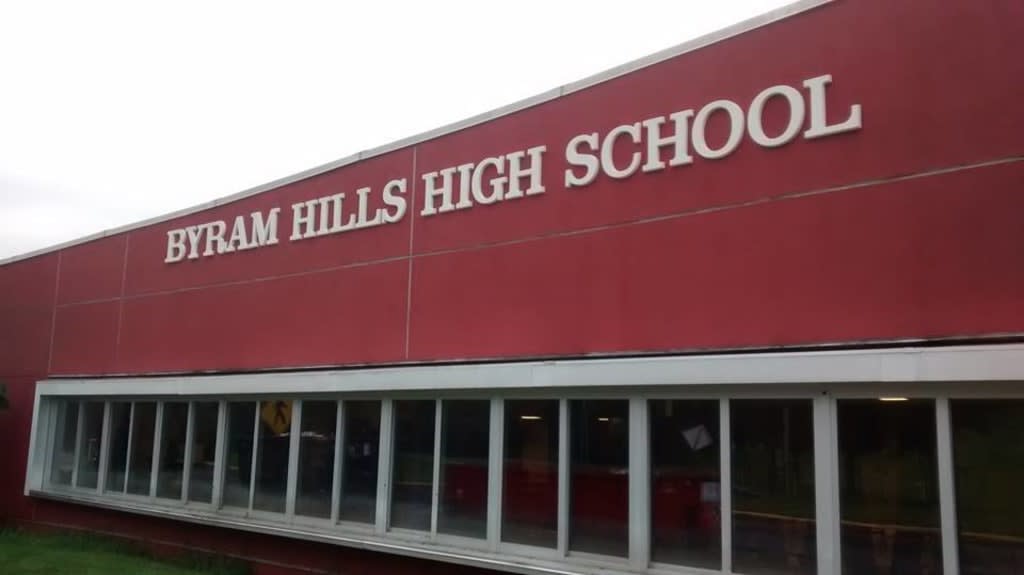Students Square Off in Debate at Byram Hills High School
A Good Old Fashioned Princeton Debate

Last Friday night Byram Hills High School hosted a debate with students from Yale and Princeton and five area high schools. Armed with their intellect, oratory abilities and deductive reasoning skills, the participants embarked on a tradition that had its heyday in another era. But debate moderator, Richard Bradley didn’t find anything out of date in throwing down old school.
“The ability to disagree in a civil and learned manner is more important than ever,” said the editor- in-chief of Worth Magazine.
Byram Hills debate team member Ron Packin clearly gets the message regardless of the outcome. “The debate community I meet and befriend is my favorite part,” he said beforehand.
Still, the junior expressed no interest in deferring on the spoils. “I like winning,” he said of his other motivation.
Princeton and Yale Throw Down
Princeton and Yale then took the baton and debated whether freed slaves should have received 40 acres from southern slaveholders after the Civil War.
Yale’s Walker Mayer opened by pointing out that land should serve as a reparation for the collective crime of slavery, and the process required legislative rather than judicial action. In accordance, the freshman reasoned that land ownership would provide economic stability and real political representation. “Land will be the basis for equality and remakes the union,” said Mayer.
Mayer’s three minutes up, Princeton’s Carolyn Liziewski began by sticking to tradition and taking a friendly little jab. “This is a good clean debate, but we couldn’t find a good clean joke about Yale,” she joked.
Her case proceeded from simple pragmatics. “Giving freed slaves 40 acres and walking away won’t solve the problem,” Liziewski stated.
In turn, Liziewski reasoned that land distribution would violently rally the KKK and ultimately wrestle land away. “Freed slaves will have no legal protection,” asserted Liziewski.
Instead, the Princeton student called for a commitment to voting rights, education and employment. “This is the best way to build political representation and equality,” said Liziewski.
Yale’s Sam Feinburg disagreed but first took Liziewski’s bait. “Yale has jokes. Our favorite is Harvard sucks but Princeton sucks more,” the freshman deadpanned.
Reiterating Mayer’s points, Feinburg allayed the doubt. “The Union Army will provide protection,” Feinburg countered.
Otherwise, Feinburg called Princeton’s perspective a “limp appeasement” in which justice must fail because “bigots will be bigots.”
Ultimately, the judges keyed on Yale’s closing argument to tip the scales. “Trying to find a perfect solution can’t be the enemy of doing what’s right,” Greenburg Town Judge Walter Rivera cited Mayer’s statement.
The World’s Policemen
Gray area again took hold as Byram Hills and Lincoln High School debated America’s role as the world’s policeman.
Lincoln’s Eviers Innocent took the affirmative. “If not us, who? China? Russia?” Eviers questioned.
Innocent then cited America’s role in stopping Nazi Germany, and how inaction in Darfur and Rwanda led to tragedy.
On the flip side, Sara Wong’s main argument for Byram Hills was reflective. “We must value ourselves first before we can police the world,” said Wong.
In other words, America must solve its own problems. “Every missile launched is a home, meal or school that could be paid for here,” Wong asserted.
Wong also defined “value” as understanding that our way of life doesn’t necessarily fit elsewhere. As a result, lives are wasted here and abroad. “We create terrorists through our policies,” said Wong.
Nonetheless, Innocent reasoned that inaction also creates terrorists and September 11th provides the proof. America would also leave a vacuum for non-democratic states to spread tyranny in Innocent’s estimation.
His teammate then put the question in human terms. “Playing a role on the world stage comes down to empathy,” said Erik Gonzalez.
Ultimately, the judges sided with Lincoln and the next issue came to the fore.
Minimum Wage Is the Max
An hourly federal minimum wage of $15.00 had Byram Hills’ Will Amorosana making his case. “Creating a livable minimum wage will stimulate the economy because low wage earners are more likely to spend,” he said. “This will create jobs and reduce unemployment.”
Amorosana also reasoned that the added expense to small businesses would be offset by increased productivity that accompanies higher pay. In addition, cost would be further reduced because low wages result in high turnover rates.
Gabriel Golombek of Ardsley wasn’t buying. “Increased productivity will not offset the expense,” said Golombek.
His logic then turned good intentions back on the taxpayers. “Unemployment and welfare payments will both rise,” said Golombek.
A uniformed minimum wage didn’t sit well either. “New York has a much different cost of living than Georgia,” he said, and states can best determine the wage.
Byram Hills’ Arjun Goyal countered with fire in his inflection. “The national average minimum wage of $9.75 creates a cycle of poverty that never ends,” asserted Goyal.
The average static since 2009 provided his close. “We can’t leave the issue to the states because they have left so many families in the dust,” said Goyal.
So, too, was Ardsley. Byram Hills took this discourse and victoriously picked up the gauntlet to close the evening.
Please like my Facebook Page.
Author can be reached at [email protected]
About the Creator
Rich Monetti
I am, I write.






Comments
There are no comments for this story
Be the first to respond and start the conversation.